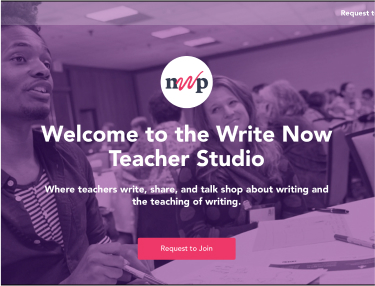Discover Content
Results for Recent Content
A Visit with the Authors of Wondrous Words: Reimagining Writers and Writing in the Elementary Classroom
A conversation about reclaiming teacher creativity and professional autonomy in elementary writing classrooms.
American Creed DBI: What is a Creed?
A document-based inquiry (DBI) unit created to support the American Creed Educational Initiative.
Continuity in the Rhode Island Writing Project: Keeping Teachers at the Center
The Presenters’ Collective Network (PCN) began as a support for teacher-consultants in developing workshops for inservice, but the Rhode Island Writing Project quickly discovered unintended purposes that strengthened the site’s continuity program. Susan Ozbek, Marjorie Roemer, Keith Sanzen,…
Supporting On-Site Teacher-Consultants: New York City Writing Project's Community of Learners
Ed Osterman demonstrates how sustained and regular professional development for on-site teacher-consultants not only benefits the teachers in the schools they serve, but also nurtures intellectual and personal growth at the New York City Writing Project. The monograph provides approaches and…
Oklahoma's Marshall Plan: Combining Professional Development and Summer Writing Camps
How Writing Project teacher-consultants and site-based teachers collaborated to plan professional development before, during, and after a summer writing camp.
Southside Elementary Writing Focus: Site-Based Leadership Reforms the Writing Curriculum
The story of an inquiry-centered approach to professional development, designed and led by teachers, that could be a model for any school.
The Fledgling Years: Lessons from the First Four Years of the NWP in Vermont
Authors Patricia McGonegal and Anne Watson, founders of a new Writing Project site, chronicle their first five years, focusing on the development of school-based inservice. They document the first years of their site, describing the role the site filled in the state, the first summer…
Write Now Teacher Studio

Where teachers write, share, and talk shop about writing and the teaching of writing
Hosted by the National Writing Project, the Write Now Teacher Studio is an open, online community of educators for educators. It’s a place to write together, examine our teaching, create and refine curricula, and work toward ever more effective and equitable practices to create confident, creative, and critical thinkers and writers in our classrooms and courses.

